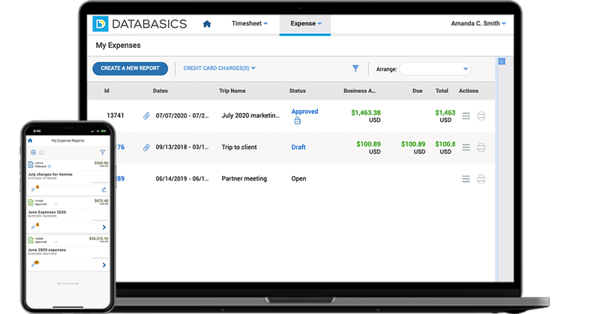
Managing Virtual Workplaces Today Requires Remote Resources Management
As providers of time tracking and expense reporting solutions, we at DATABASICS are witnessing first-hand what the COVID-19 pandemic is doing to businesses. The resulting recession’s effects are typical for major downturns: an overall drop in activity with select sectors, like online retail, benefiting, and others, like hospitality, suffering CAT 5 devastation.
What’s different this time is that out of the rubble, a whole new way of working has emerged: The Virtual Workplace (TVW). Unlike its predecessor, Tele-Commuting, TVW is not simply a convenience or special case accommodation. TVW has become a necessary replacement for the practice of physically congregating employees to perform their work. In the past, organizations have experimented with virtualization. Today, the testing is over. Organizations have no choice but to make it work.
Employee 'miscellaneous' spend has exploded into distinct, major categories such as office supplies, furniture and fixtures, internet services, and computer hardware and software. With the spend, of course, comes questions.
This disruption is evident in the expense reporting data we collect. While air and hotel expenditures have plummeted, there has been a surge in home office-related spend. Managing this spend, and even more importantly, the activities behind it, has caught many organizations flat-footed. In the past, for most businesses, employee purchases have been heavily weighted towards travel and entertainment. Best practice had it that employees who met with customers or needed to go on the road were issued credit cards. A Travel Manager assumed oversight responsibilities, and all was well (or at least good enough).
With TVW, you can suddenly have your entire workforce—not just the travelers—needing to buy things. These purchases, in ever greater proportion, have nothing to do with travel. Employee “miscellaneous” spend has exploded into distinct, major categories such as office supplies, furniture and fixtures, internet services, and computer hardware and software. With the spend, of course, comes questions.

For office supplies: should employees just buy what they need, or is some kind of requisition system needed? Should they source supplies on their own, or should the organization contract with specific, approved vendors?
Furniture and fixtures pose their own challenges. What is considered appropriate and sufficient for the employee’s role? Should employees be expected to contribute space and their personal assets to do their jobs? Who owns what is purchased? What are the tax implications of employers’ answers to these questions?
Technology purchases—hardware, software and associated services—require tight control. They are expensive to buy, expensive to maintain, must be secure, and are the enabler and foundation of productivity for TVW. Organizations must get the technology and associated management of it right.
the old model of Travel Manager coordinating with line supervisors is ill-suited to manage this new spend directly...Remote Resources Management is cross-disciplinary and breaks down the silos—Travel, HR, IT, Purchasing, etc.—that are not designed for close, ongoing multi-lateral coordination.
Clearly, the old model of Travel Manager coordinating with line supervisors is ill-suited to manage this new spend directly. Others need to have a hand in this, including Purchasing, HR and IT. An adequate response will minimally include new standards, new processes and new technology. And a new organization structure tasked with making it all work. We call it Remote Resources Management (RRM). RRM is cross-disciplinary and breaks down the silos—Travel, HR, IT, Purchasing, etc.—that are not designed for close, ongoing multi-lateral coordination.
Of course, we are all suspicious of more bureaucracy, but the alternative is delays, inconsistency, finger-pointing and self-serving decisions. In other words, impaired productivity, waste, demoralization and the very real possibility of failure. Think about it.
DATABASICS is driven to meet the most demanding time and expense management challenges through a combination of deep expertise, next-gen technology, and a focus on the unique needs of each customer. Powered by decades of experience, our team delivers world-class time and expense management solutions that are the right choice for today and easily adapt to the uncertainties of tomorrow.
Subscribe to our blog
Recent Posts
Posts by Topics
- Expense Management Software (130)
- DATABASICS (69)
- Time Tracking Software (47)
- Leave Management System (26)
- P-Cards (9)
- Home Healthcare (8)
- Government Contractors (7)
- Nonprofit Organizations (7)
- International Development (6)
- Receipt Management (6)
- Advanced OCR (2)
- CROs (2)
- Staffing Agencies (2)
- Vendor Invoice Management (2)
- Audit Management Software (1)
- Construction (1)
- Field Service Management (1)
- Integration (1)
- Microsoft Dynamics (1)
- Oracle NetSuite (1)
- Partnerships (1)
- Professional Services (1)
Read on

Expense Fraud Isn’t New Because of AI; It’s a Systems & Operational Problem
Read Now
Enhancing Employee Experience with Mobile Expense Management
Read Now
Maintaining Compliance with Mobile Expense Management Tools
Read NowSeamless Integration of Time Tracking and Payroll
Read Now
Seamless Migration from Nexonia: Unified Time and Expense Solutions
Read Now
Nexonia Migration: The Best Alternative for Timesheets & Expense Management
Read Now
Subscribe to Our Blog
Subscribe to our blog and get the latest in time tracking and expense reporting news and updates.